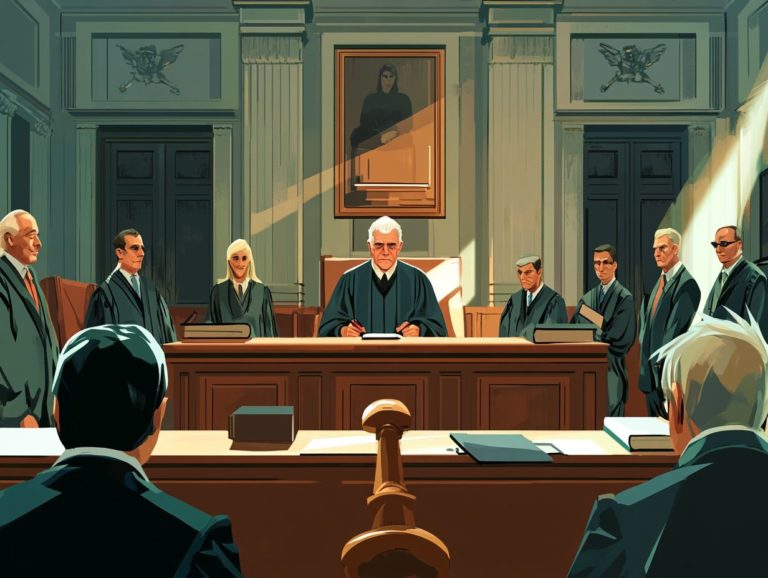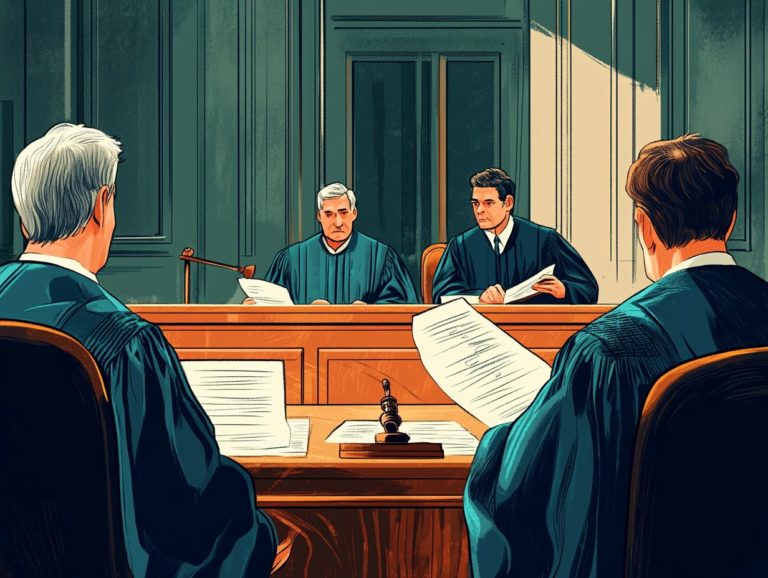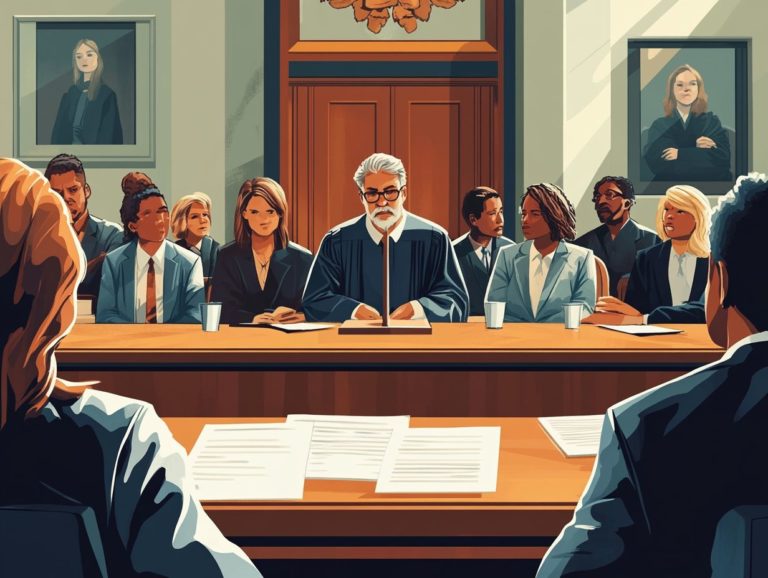The Influence of Social Issues on IP Litigation
In today’s swiftly changing legal landscape, you’re likely to notice the growing prominence of social issues within intellectual property (IP) litigation. As societal values evolve, they shape both legal practices and the outcomes of cases.
Let s dive into how social concerns are reshaping IP litigation today, covering topics from diversity and inclusion to environmental impacts. With real-world examples and case studies, this article underscores the implications of these trends for the legal system while proposing strategies for harmonizing social responsibility with legal obligations.
You are invited to explore these complex issues with us as we examine their potential effects on future litigation.
Contents
- Key Takeaways:
- The Intersection of Social Issues and IP Litigation
- Social Issues Impacting IP Litigation
- Addressing Social Issues in IP Litigation
- Potential Effects on the Legal System
- Balancing Social Responsibility and Legal Obligations
- Frequently Asked Questions
- What is the influence of social issues on IP litigation?
- How do social issues affect IP litigation?
- Can social issues impact the outcome of an IP case?
- What are some examples of social issues that may arise in IP litigation?
- How can social issues be addressed in IP litigation?
- Is there a relationship between IP litigation and social justice?
Key Takeaways:
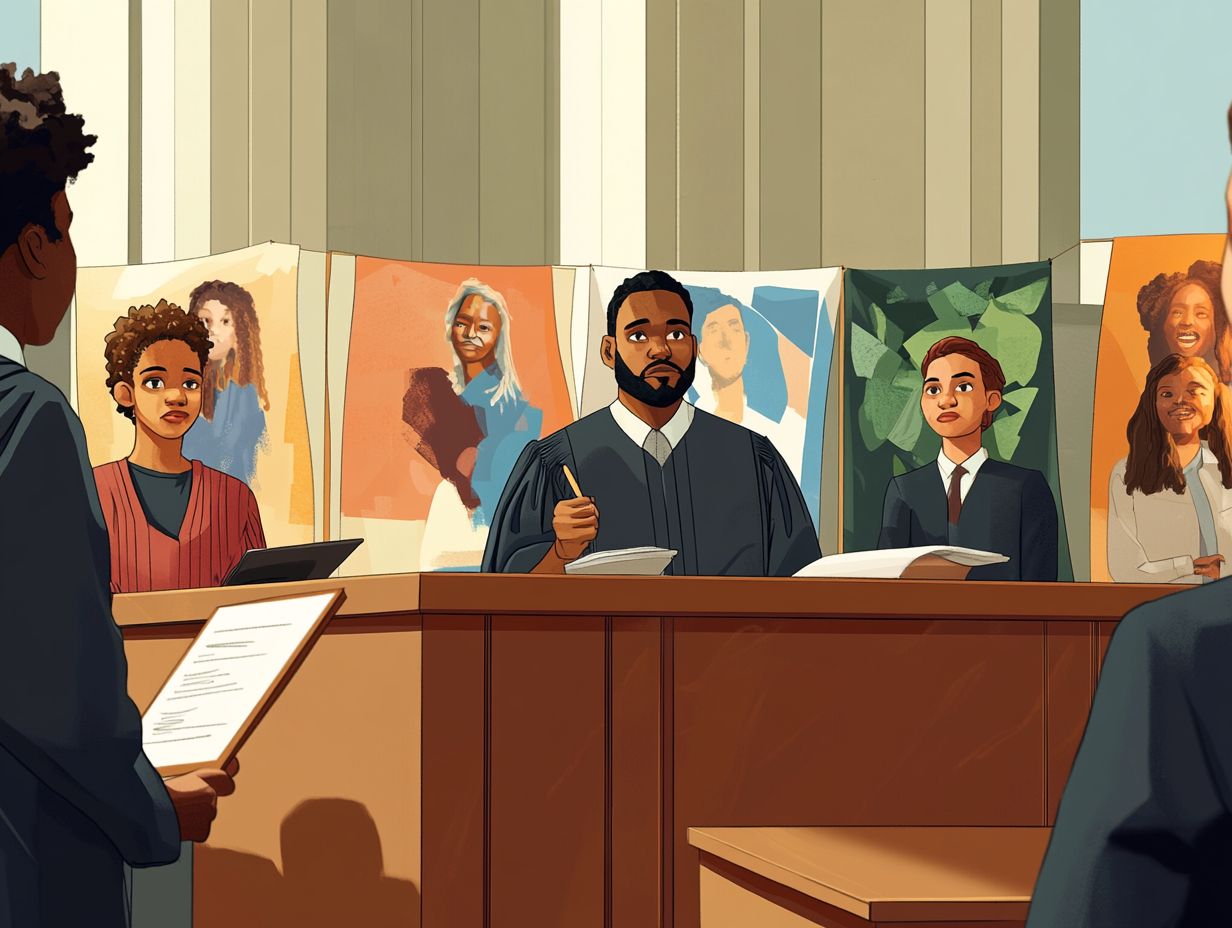
Social issues such as diversity and inclusivity significantly impact IP litigation cases, requiring a deeper understanding of their intersection. The role of public perception in IP litigation can be seen in examples like cultural appropriation and trademark infringement, which highlight the consequences of neglecting social issues in these cases.
Strategies include incorporating ethical considerations and engaging in dialogue to address social issues, potentially improving the legal system as a whole.
The Intersection of Social Issues and IP Litigation
This intersection presents a dynamic landscape where the influence of social media and shifting cultural norms challenges traditional legal frameworks. Here, brand recognition and customer engagement intertwine with legal matters such as copyright infringement, trademark infringement, and trade dress disputes.
Understanding this complex relationship is crucial as it highlights how social issues shape litigation and the legal consequences for businesses navigating these challenges.
Scholars like Carlos Vila from Tulane University delve into these evolving dynamics, providing valuable insights that can inform your approach in this arena.
Understanding the Relationship
As a brand, understanding how social media impacts your intellectual property is vital. You want to protect your identity while engaging with consumers in a legally complex digital world.
In this environment, you must navigate a web of user-generated content, where consumers frequently share their interpretations and experiences with your products and logos. While this sharing can boost your brand visibility and foster a sense of community, it also presents risks, as misuse or misrepresentation can easily occur.
Social media platforms play a pivotal role in this dynamic, acting as both a channel for creative expression and a potential battleground for legal disputes. Therefore, it s crucial to establish clear guidelines and cultivate a community that respects intellectual property rights, ensuring a harmonious balance between engagement and protective measures.
Social Issues Impacting IP Litigation
Social issues, including the surge of digital content, employee behavior on social media, and the evolving landscape of marketing challenges, profoundly influence IP litigation. This dynamic environment compels you to reassess your strategies and manage IP rights, especially when brand representation can be easily misappropriated online.
Join us in exploring these social issues further and see how they can impact your brand s future!
Examples and Case Studies
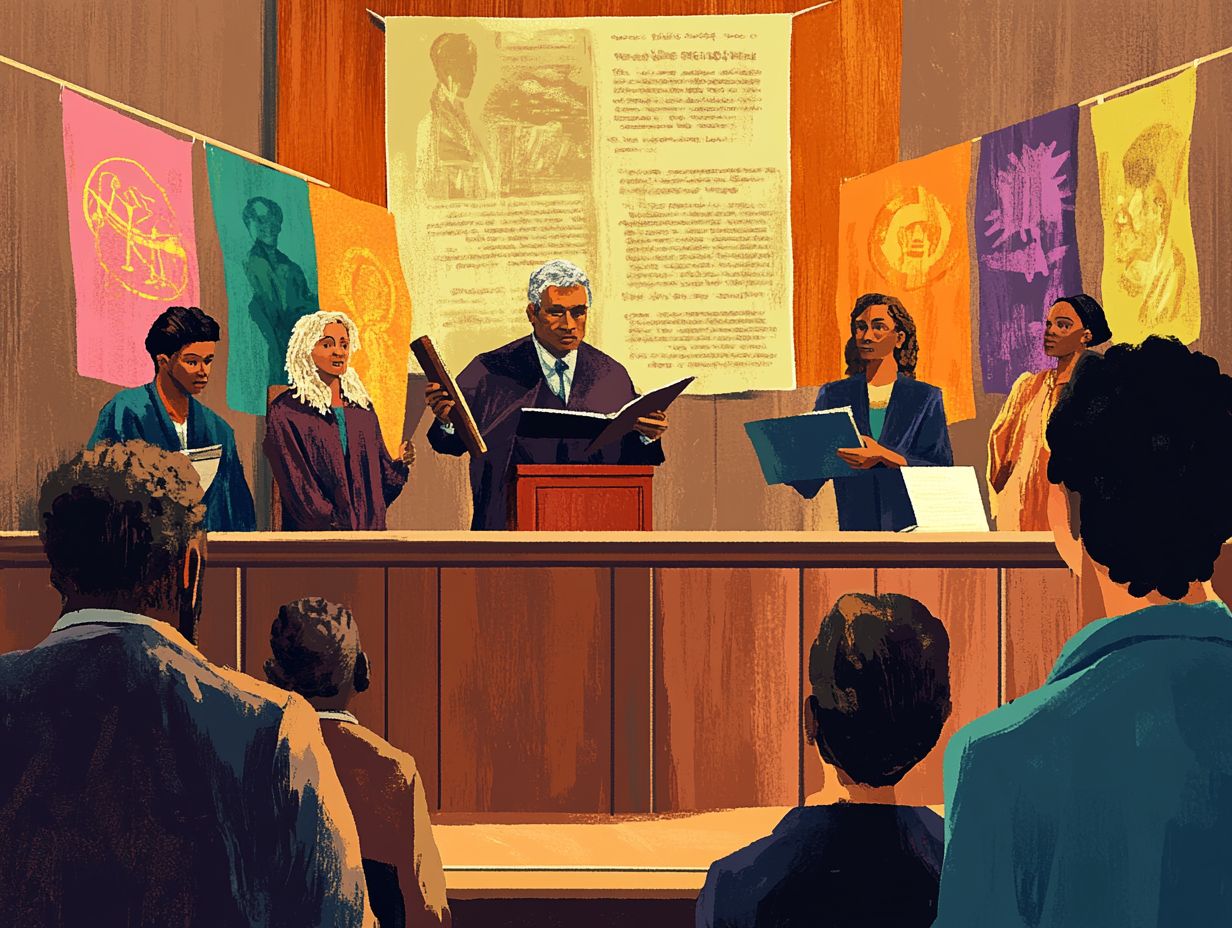
Analyzing prominent case studies in intellectual property (IP) litigation, especially those centered around trademark infringement and their legal implications, provides you with invaluable insights into how brands adeptly navigate the intricate landscape of brand recognition amidst social challenges.
Take, for instance, the high-profile case of Converse v. 11C. The footwear giant defended its iconic Chuck Taylor mark against a competitor s similar designs, arguing that such imitations diluted its brand identity. The court ultimately ruled in favor of Converse, highlighting the importance of safeguarding established trademarks in an ever-evolving marketplace.
This case serves as a powerful reminder for businesses: developing robust branding strategies is essential not only for resonating with consumers but also for aligning with legal standards to protect their intellectual property.
Having a well-defined understanding of these legal frameworks is crucial for you to anticipate potential infringements. It will also strengthen your position within competitive landscapes.
Addressing Social Issues in IP Litigation
Addressing social issues in IP litigation calls for innovative strategies and solutions. These should seamlessly integrate educational tools with comprehensive monitoring policies.
This approach not only safeguards financial stability but also strengthens your rights in an ever-evolving digital landscape.
Strategies and Solutions
Developing effective strategies and solutions to tackle IP rights and legal issues is crucial for you to uphold your brand representation. This will help mitigate the risks posed by social media’s impact on intellectual property.
Start by establishing a solid legal framework that clearly outlines your IP rights. This will act as a foundation for any necessary actions you may need to take in case of infringement.
Implement proactive measures to monitor online content, such as using specialized software that tracks unauthorized use or leveraging search engines to identify potential infringements. Take this step to greatly enhance your protection!
It’s important to educate your employees about compliance with IP laws and the details of how to represent your brand in digital spaces. By fostering a culture of vigilance and responsibility, you can prevent unintentional violations and misrepresentation, ensuring your brand remains intact and respected.
Potential Effects on the Legal System
The impact of social issues on the legal system is significant. It reshapes the realm of intellectual property litigation and presents new considerations for the application and enforcement of laws in the context of social media and its widespread influence.
Implications for Future Cases
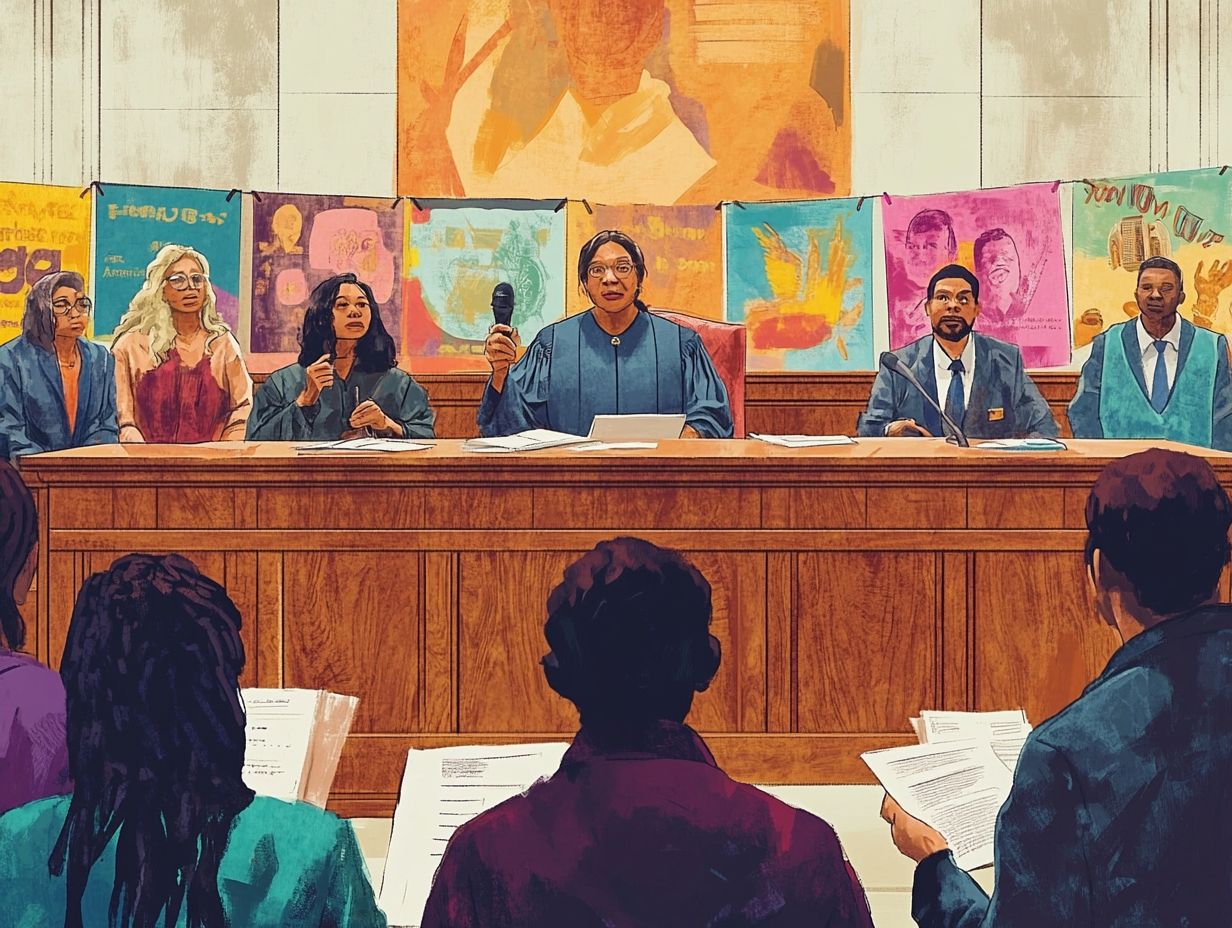
The implications for future cases of IP litigation are significant as social issues continue to evolve. This prompts you to reevaluate the existing legal framework and how it adapts to new challenges posed by digital content and social media.
This reevaluation may require you to examine how shared cultural practices, user-generated content, and the rapid dissemination of information influence perceptions of ownership and responsibility.
As society increasingly embraces collaborative and communal consumption of digital media, you may find courts grappling with disputes that challenge traditional notions of copyright and trademark protections.
Legislative bodies could be compelled to enact reforms that reflect these shifting dynamics. Now is the time to adapt to these changes to stay ahead!
Balancing Social Responsibility and Legal Obligations
Balancing social responsibility with legal obligations is essential for brands that aspire to maintain their identity while skillfully navigating the complex legal terrain of intellectual property rights and employee conduct in the realm of social media.
This dual focus not only reinforces their reputation but also ensures compliance in an ever-evolving digital environment.
Start implementing these strategies today to protect your brand!
Finding a Middle Ground
Balancing social responsibility with legal requirements is crucial for your brand. It allows you to showcase your values while following laws that protect intellectual creations.
To navigate this landscape, adopt a clear approach. Engage in open communication about your corporate social responsibility (CSR) initiatives to build consumer trust.
Consider a well-known cosmetics brand that successfully launched a campaign focused on sustainable sourcing. This ensured they followed ethical guidelines while protecting their unique products.
By collaborating with non-profit organizations, they crafted a compelling narrative that resonated with environmentally conscious consumers. You can also establish internal policies that promote compliance while embedding social values throughout your operations, creating a harmonious blend of responsibility and legality.
Frequently Asked Questions
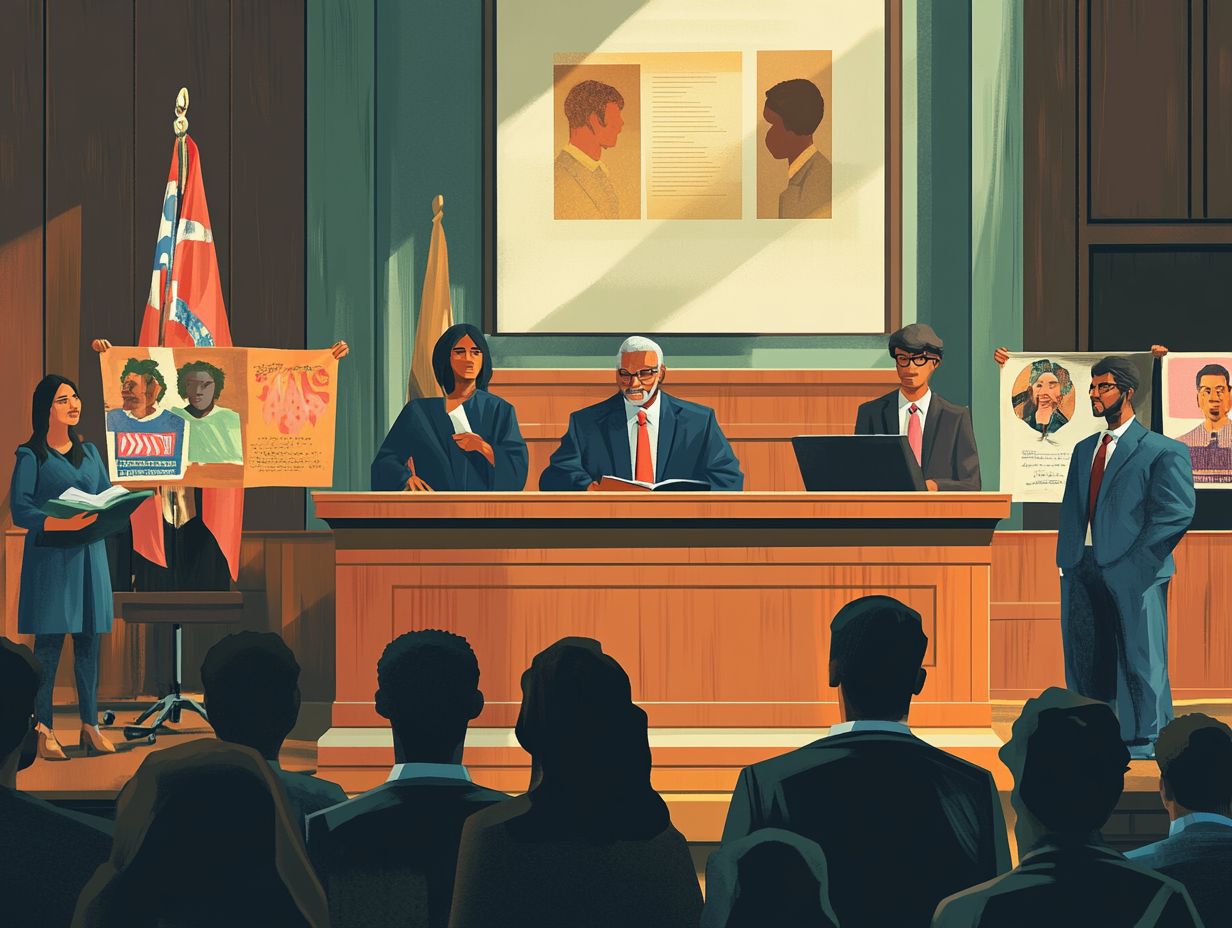
Social issues affect IP litigation by influencing legal disputes related to copyright, trademarks, and patents. Concerns like diversity and ethics play a significant role in these cases, as highlighted in discussions about the influence of technology on IP litigation outcomes.
Social issues can shape judges’ and jurors’ attitudes, influencing how laws are interpreted and applied. They may also change legal outcomes or even prompt new regulations.
Yes, social issues can significantly impact the outcome of an IP case. For instance, if a case involves race or gender discrimination, societal views may influence decisions and ultimately affect the case’s outcome, highlighting the role of the internet in IP litigation.
Examples of social issues in IP litigation include cultural appropriation, privacy concerns, discrimination based on race or gender, and the protection of indigenous knowledge. These topics often highlight the intersection of ethics and IP litigation and can arise in copyright, trademark, or patent disputes.
Social issues can be addressed in IP litigation by promoting diversity and inclusivity in the legal system and educating judges and lawyers on relevant social topics. Additionally, understanding the relationship between IP litigation and market trends can help parties in IP disputes incorporate ethical and socially responsible practices in their business operations to prevent potential litigation.
Yes, there is a significant relationship between IP litigation and social justice. IP rights are often tied to economic and social power, and the outcomes of IP cases can have a substantial effect on social justice issues, such as access to affordable medication and the fair use of copyrighted materials for social and political commentary.



